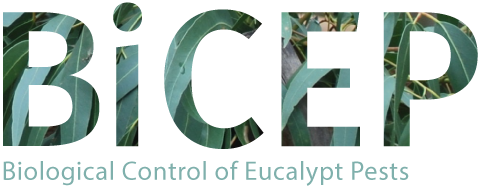About us
About us
During the past few decades the area of eucalypt plantations around the world has expanded dramatically, supported by exceptional tree growth and performance. Over time the incidence and impact of insect pests has increased and now poses a major impediment to the continued expansion of this important industry.
During the past few decades the area of eucalypt plantations around the world has expanded dramatically, supported by exceptional tree growth and performance. Over time the incidence and impact of insect pests has increased and now poses a major impediment to the continued expansion of this important industry.
BiCEP will provide coordinated, collaborative solutions to the problem of eucalypt pests by:
Evaluating and supplying biological control agents to eligible countries
Introductions of invasive Australian pests to the major eucalypt plantation growing regions of the world continue to accelerate as volumes of trade and movements of people increase. Not only the rate of introductions but also the speed of spread to new regions is expanding. This rapid spread of insects and a general lack of basic biological data compromise efforts to coordinate and optimise biological control programs around the world. BiCEP will work to coordinate the identification, evaluation, selection, collection and shipping of natural enemies to affected regions.
Developing a forest biosecurity surveillance network focussed on eucalypt pests and pathogens
Around the world, endemic insects that have host-switched to eucalypts or are extreme generalists pose a biosecurity threat, both to neighbouring countries and to Australia. BiCEP will promote an active ‘over the horizon’ surveillance network in the world’s major eucalypt growing regions to proactively assess and manage risk.
Researching the role of natural enemies in pest population regulation in eucalypt plantations in Australia and overseas
Within Australia, herbivorous pest insects can exploit eucalypt plantation monocultures and reach damaging population densities. These insects have a suite of co-evolved natural enemies that provide ecosystem services in the form of regulation of pest populations. For most of these pests, little is known about the natural enemies present in plantations and the role they play in population regulation. BiCEP will explore management approaches of relevance to eucalypt plantations everywhere, including augmentative biological control and tritrophic manipulation.
BiCEP will provide coordinated, collaborative solutions to the problem of eucalypt pests by:
Evaluating and supplying biological control agents to eligible countries
Introductions of invasive Australian pests to the major eucalypt plantation growing regions of the world continue to accelerate as volumes of trade and movements of people increase. Not only the rate of introductions but also the speed of spread to new regions is expanding. This rapid spread of insects and a general lack of basic biological data compromise efforts to coordinate and optimise biological control programs around the world. BiCEP will work to coordinate the identification, evaluation, selection, collection and shipping of natural enemies to affected regions.
Developing a forest biosecurity surveillance network focussed on eucalypt pests and pathogens
Around the world, endemic insects that have host-switched to eucalypts or are extreme generalists pose a biosecurity threat, both to neighbouring countries and to Australia. BiCEP will promote an active ‘over the horizon’ surveillance network in the world’s major eucalypt growing regions to proactively assess and manage risk.
Researching the role of natural enemies in pest population regulation in eucalypt plantations in Australia and overseas
Within Australia, herbivorous pest insects can exploit eucalypt plantation monocultures and reach damaging population densities. These insects have a suite of co-evolved natural enemies that provide ecosystem services in the form of regulation of pest populations. For most of these pests, little is known about the natural enemies present in plantations and the role they play in population regulation. BiCEP will explore management approaches of relevance to eucalypt plantations everywhere, including augmentative biological control and tritrophic manipulation.
